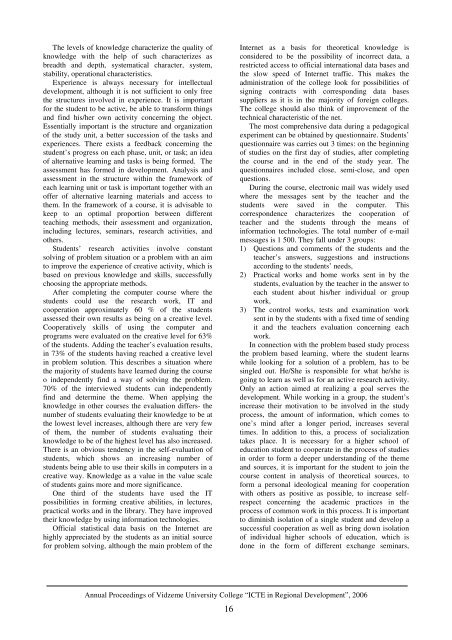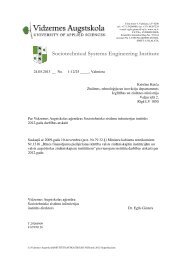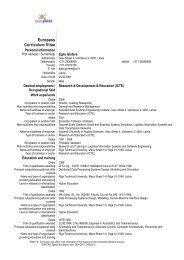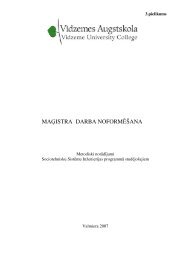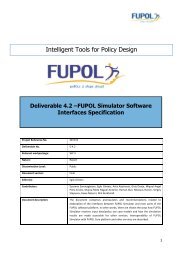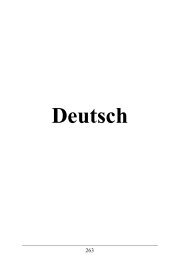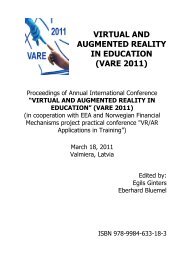The levels of knowledge characterize the quality ofknowledge with the help of such characterizes asbreadth and depth, systematical character, system,stability, operational characteristics.Experience is always necessary for <strong>in</strong>tellectualdevelopment, although it is not sufficient to only freethe structures <strong>in</strong>volved <strong>in</strong> experience. It is importantfor the student to be active, be able to transform th<strong>in</strong>gsand f<strong>in</strong>d his/her own activity concern<strong>in</strong>g the object.Essentially important is the structure and organizationof the study unit, a better succession of the tasks andexperiences. There exists a feedback concern<strong>in</strong>g thestudent’s progress on each phase, unit, or task; an ideaof alternative learn<strong>in</strong>g and tasks is be<strong>in</strong>g formed. Theassessment has formed <strong>in</strong> development. Analysis andassessment <strong>in</strong> the structure with<strong>in</strong> the framework ofeach learn<strong>in</strong>g unit or task is important together with anoffer of alternative learn<strong>in</strong>g materials and access tothem. In the framework of a course, it is advisable tokeep to an optimal proportion between differentteach<strong>in</strong>g methods, their assessment and organization,<strong>in</strong>clud<strong>in</strong>g lectures, sem<strong>in</strong>ars, research activities, andothers.Students’ research activities <strong>in</strong>volve constantsolv<strong>in</strong>g of problem situation or a problem with an aimto improve the experience of creative activity, which isbased on previous knowledge and skills, successfullychoos<strong>in</strong>g the appropriate methods.After complet<strong>in</strong>g the computer course where thestudents could use the research work, IT andcooperation approximately 60 % of the studentsassessed their own results as be<strong>in</strong>g on a creative level.Cooperatively skills of us<strong>in</strong>g the computer andprograms were evaluated on the creative level for 63%of the students. Add<strong>in</strong>g the teacher’s evaluation results,<strong>in</strong> 73% of the students hav<strong>in</strong>g reached a creative level<strong>in</strong> problem solution. This describes a situation wherethe majority of students have learned dur<strong>in</strong>g the courseo <strong>in</strong>dependently f<strong>in</strong>d a way of solv<strong>in</strong>g the problem.70% of the <strong>in</strong>terviewed students can <strong>in</strong>dependentlyf<strong>in</strong>d and determ<strong>in</strong>e the theme. When apply<strong>in</strong>g theknowledge <strong>in</strong> other courses the evaluation differs- thenumber of students evaluat<strong>in</strong>g their knowledge to be atthe lowest level <strong>in</strong>creases, although there are very fewof them, the number of students evaluat<strong>in</strong>g theirknowledge to be of the highest level has also <strong>in</strong>creased.There is an obvious tendency <strong>in</strong> the self-evaluation ofstudents, which shows an <strong>in</strong>creas<strong>in</strong>g number ofstudents be<strong>in</strong>g able to use their skills <strong>in</strong> computers <strong>in</strong> acreative way. Knowledge as a value <strong>in</strong> the value scaleof students ga<strong>in</strong>s more and more significance.One third of the students have used the ITpossibilities <strong>in</strong> form<strong>in</strong>g creative abilities, <strong>in</strong> lectures,practical works and <strong>in</strong> the library. They have improvedtheir knowledge by us<strong>in</strong>g <strong>in</strong><strong>format</strong>ion technologies.Official statistical data basis on the Internet arehighly appreciated by the students as an <strong>in</strong>itial sourcefor problem solv<strong>in</strong>g, although the ma<strong>in</strong> problem of theInternet as a basis for theoretical knowledge isconsidered to be the possibility of <strong>in</strong>correct data, arestricted access to official <strong>in</strong>ternational data bases andthe slow speed of Internet traffic. This makes theadm<strong>in</strong>istration of the college look for possibilities ofsign<strong>in</strong>g contracts with correspond<strong>in</strong>g data basessuppliers as it is <strong>in</strong> the majority of foreign colleges.The college should also th<strong>in</strong>k of improvement of thetechnical characteristic of the net.The most comprehensive data dur<strong>in</strong>g a pedagogicalexperiment can be obta<strong>in</strong>ed by questionnaire. Students’questionnaire was carries out 3 times: on the beg<strong>in</strong>n<strong>in</strong>gof studies on the first day of studies, after complet<strong>in</strong>gthe course and <strong>in</strong> the end of the study year. Thequestionnaires <strong>in</strong>cluded close, semi-close, and openquestions.Dur<strong>in</strong>g the course, electronic mail was widely usedwhere the messages sent by the teacher and thestudents were saved <strong>in</strong> the computer. Thiscorrespondence characterizes the cooperation ofteacher and the students through the means of<strong>in</strong><strong>format</strong>ion technologies. The total number of e-mailmessages is 1 500. They fall under 3 groups:1) Questions and comments of the students and theteacher’s answers, suggestions and <strong>in</strong>structionsaccord<strong>in</strong>g to the students’ needs,2) Practical works and home works sent <strong>in</strong> by thestudents, evaluation by the teacher <strong>in</strong> the answer toeach student about his/her <strong>in</strong>dividual or groupwork,3) The control works, tests and exam<strong>in</strong>ation worksent <strong>in</strong> by the students with a fixed time of send<strong>in</strong>git and the teachers evaluation concern<strong>in</strong>g eachwork.In connection with the problem based study processthe problem based learn<strong>in</strong>g, where the student learnswhile look<strong>in</strong>g for a solution of a problem, has to bes<strong>in</strong>gled out. He/She is responsible for what he/she isgo<strong>in</strong>g to learn as well as for an active research activity.Only an action aimed at realiz<strong>in</strong>g a goal serves thedevelopment. While work<strong>in</strong>g <strong>in</strong> a group, the student’s<strong>in</strong>crease their motivation to be <strong>in</strong>volved <strong>in</strong> the studyprocess, the amount of <strong>in</strong><strong>format</strong>ion, which comes toone’s m<strong>in</strong>d after a longer period, <strong>in</strong>creases severaltimes. In addition to this, a process of socializationtakes place. It is necessary for a higher school ofeducation student to cooperate <strong>in</strong> the process of studies<strong>in</strong> order to form a deeper understand<strong>in</strong>g of the themeand sources, it is important for the student to jo<strong>in</strong> thecourse content <strong>in</strong> analysis of theoretical sources, toform a personal ideological mean<strong>in</strong>g for cooperationwith others as positive as possible, to <strong>in</strong>crease selfrespectconcern<strong>in</strong>g the academic practices <strong>in</strong> theprocess of common work <strong>in</strong> this process. It is importantto dim<strong>in</strong>ish isolation of a s<strong>in</strong>gle student and develop asuccessful cooperation as well as br<strong>in</strong>g down isolationof <strong>in</strong>dividual higher schools of education, which isdone <strong>in</strong> the form of different exchange sem<strong>in</strong>ars,Annual <strong>Proceed<strong>in</strong>gs</strong> of Vidzeme University College “ICTE <strong>in</strong> Regional Development”, 200616
projects and through IT. Hence, it is important forstudents to provide the possibility to become aware ofand make use of IT, one of the ma<strong>in</strong> <strong>in</strong><strong>format</strong>ioncollection and data process<strong>in</strong>g means nowadays,ensur<strong>in</strong>g exchange of <strong>in</strong><strong>format</strong>ion on a much largerscale.E-LEARNING AS A POSSIBILITY TO USE NEWMODELS OF LEARNINGIT comes <strong>in</strong> our life more and more therefore thereis a necessity to make student friendly with IT <strong>in</strong>everyday life. One of the ways to make it possible is e-learn<strong>in</strong>g as a basic method for distance learn<strong>in</strong>g and e-learn<strong>in</strong>g as a support method for full time students.Much of the early research on Web-based learn<strong>in</strong>gfocused on the technology and ignored the <strong>in</strong>structionaldesign imbedded <strong>in</strong> the course. Meyer shows that thelow numbers for <strong>in</strong>tegration and resolution were duethe need for students to take more time to reflect on theproblem, and <strong>in</strong>dividuals were reluctant to offersolutions that would be scorned by others <strong>in</strong> the class(Meyer 2003, Cakula 2001). The opportunity forreflection is especially suited to asynchronous learn<strong>in</strong>genvironments, as well as for students whose learn<strong>in</strong>gstyles require some time and reflection to make senseof <strong>in</strong><strong>format</strong>ion.A successful e-learn<strong>in</strong>g class needs to solve anumber of new problems that have not been seenbefore. One of them is how to effectively use e-learn<strong>in</strong>g environment to improve the quality ofdistance learn<strong>in</strong>g through networked learn<strong>in</strong>g<strong>in</strong>teractivity and new <strong>format</strong> of <strong>in</strong>structional tools. Itwill serve as feedback to the producers and help themmake better decisions on develop<strong>in</strong>g, adm<strong>in</strong>istrat<strong>in</strong>gand manipulat<strong>in</strong>g <strong>in</strong>ternal network for educationalpurposes, and a feedback to the educators to betterunderstand the e-learn<strong>in</strong>g class, and improve their<strong>in</strong>structional design and methodology for thenetworked distance class. The onl<strong>in</strong>e class adds adifferent array of pedagogical concepts and practice to<strong>in</strong>struction. Students do not know the regulations of theclass, how to learn onl<strong>in</strong>e, how to discuss, and how tokeep up with the class schedule and the <strong>in</strong>structor’sexpectation. F<strong>in</strong>d<strong>in</strong>gs of research of Sha Li are that asnew learners <strong>in</strong> onl<strong>in</strong>e class, many students expressedtheir excitement about try<strong>in</strong>g a distance class. Thereality of tak<strong>in</strong>g part <strong>in</strong> the first distance class could behardest when the class first started. The skillsnecessary to use Learn<strong>in</strong>g Space take time to acquire atthe start of the semester while students are busy tak<strong>in</strong>gnew course (Sha 2003)One advantage is, that personalized documents,which lead the learner without needless detoursdirectly from her/his current base of knowledge to thedesired learn<strong>in</strong>g objective, can be generatedautomatically and every time.There are some positive and some negative aspectsof learn<strong>in</strong>g <strong>in</strong> e-learn<strong>in</strong>g environment. On technologyaspect the positive is that technology is an <strong>in</strong>centive forlearn<strong>in</strong>g, it provides variety of tools to full fit academicaccomplishment. Also technically <strong>in</strong>timidated withlearn<strong>in</strong>g network, concerned with lack of technologybackground. The benefit is to offer e-learn<strong>in</strong>g coursefor IT students but also tourism students have veryopened for new learn<strong>in</strong>g methods such as e-learn<strong>in</strong>g.E-learn<strong>in</strong>g class provides learn<strong>in</strong>g any time and anyplace; helps mediate the time and space conflicts.Asynchronous <strong>in</strong>teraction is convenient tocommunicate any time and anywhere to checkassignments dur<strong>in</strong>g travel. The negative aspect is notaccustomed to the asynchronous <strong>in</strong>teraction.Synchronous <strong>in</strong>teraction is more emotionally,cognitively, and mentally engag<strong>in</strong>g. Immediateresponses could generate fast and more effectivefeedback that asynchronous response. Good way is toorganize sem<strong>in</strong>ars with directly def<strong>in</strong>ed rules. Therewas successful experiment of onl<strong>in</strong>e asynchronoussem<strong>in</strong>ars <strong>in</strong> Vidzeme University College.Learn<strong>in</strong>g environment could be a convenientnetwork for onl<strong>in</strong>e learn<strong>in</strong>g, can secure retrieve anycourse resources from it and perform any class-relatedlearn<strong>in</strong>g activities <strong>in</strong> this place but learn<strong>in</strong>genvironment could be not user-friendly. It could behard to f<strong>in</strong>d th<strong>in</strong>gs student want for the course previewand class assignment. It is easy to mess up with thework. The solution is to f<strong>in</strong>d an environment userfriendly.The <strong>in</strong>structor is patient and ready to helpstudents. His responses to the e-mails and discussionquestions could meet student needs but the <strong>in</strong>structordo not teaches students. Sometimes student should waitfor an answer for longer time that he wants.Disadvantage if us<strong>in</strong>g e-learn<strong>in</strong>g is that student couldnever show up <strong>in</strong> the discussion board. In addition,once the class was shifted to cyberspace, studentscould not see the teacher’s face and effort and couldnot grasp what was the right way for a teacher to teach.The better way is to start course with some<strong>in</strong>troductory face-to-face part. When the student isswitch<strong>in</strong>g to the distance-learn<strong>in</strong>g environment, he isoften confused by it old traditional learn<strong>in</strong>g style andcaused problems such forgett<strong>in</strong>g the onl<strong>in</strong>e class. Theother problem is that the students compla<strong>in</strong>ed that thisclass require more work than a regular class (Sha2003).A good transition and accommodation to the newlearn<strong>in</strong>g <strong>format</strong> could m<strong>in</strong>imize the start<strong>in</strong>g difficultyand maximize learn<strong>in</strong>g effect.There are some e-learn<strong>in</strong>g benefits and problemsdescribed by researchers of the United K<strong>in</strong>gdom andUSA. As the first benefit is <strong>in</strong>dependent/autonomouslearn<strong>in</strong>g. Through us<strong>in</strong>g educational technologies,students have more control over the management oftheir learn<strong>in</strong>g. Each learner is an <strong>in</strong>dividual, with his orher own motivation for study<strong>in</strong>g, access to resources,Annual <strong>Proceed<strong>in</strong>gs</strong> of Vidzeme University College “ICTE <strong>in</strong> Regional Development”, 200617
- Page 1 and 2: ISBN 9984-633-03-9Annual Proceeding
- Page 3 and 4: “Development of Creative Human -
- Page 5 and 6: TABLE OF CONTENTSINTELLIGENT SYSTEM
- Page 7 and 8: INTELLIGENT SYSTEM FOR LEARNERS’
- Page 9 and 10: LEARNER 1GROUP OF HUMAN AGENTSLEARN
- Page 11 and 12: QuantityQuantityFigure 6. Distribut
- Page 13 and 14: LEARNERStructure of theconcept mapL
- Page 15 and 16: WEB-BASED INTELLIGENT TUTORING SYST
- Page 17 and 18: materials to be presented and which
- Page 19 and 20: INFORMATION TECHNOLOGIES AND E-LEAR
- Page 21: correspondence with the course aim
- Page 25 and 26: APPLICATION OF MODELING METHODS IN
- Page 27 and 28: can support configuration managemen
- Page 29 and 30: The EKD is one of the Enterprise mo
- Page 31 and 32: CHANGES TO TRAINING AND PERSPECTIVE
- Page 33 and 34: or an end, yet none of these attitu
- Page 35 and 36: make decisions. It cannot be volunt
- Page 37 and 38: logs), data and video conferencing
- Page 39 and 40: Ability to follow user’s multi-ta
- Page 41 and 42: CONCLUSIONSEDUSA method gives us a
- Page 43 and 44: in successful SD. Given this situat
- Page 45 and 46: SPATIAL INFORMATIONFor the visualis
- Page 47 and 48: MOBILE TECHNOLOGIES USE IN SERVICES
- Page 49 and 50: learning environment (Learning Mana
- Page 51 and 52: ago only some curricula on Logistic
- Page 53 and 54: The Web-based version can be access
- Page 55 and 56: Web-portal, which incorporates diff
- Page 57 and 58: DO INTELLIGENT OBJECTS AUTOMATICALL
- Page 59 and 60: Table 1. Examples for introducing R
- Page 61 and 62: workable influencing of the process
- Page 63 and 64: are handed over to the objects and
- Page 65 and 66: • Basic processes, such as wareho
- Page 67 and 68: THE ECR E-COACH: A VIRTUAL COACHING
- Page 69 and 70: participating in the workshops and
- Page 71 and 72: • Assessment modules enable indiv
- Page 73 and 74:
with pictures and illustrated graph
- Page 75 and 76:
ECR Question Banknumber category su
- Page 77 and 78:
educational programme that follows
- Page 79 and 80:
DEVELOPMENT OF WEB BASED GRAVITY MO
- Page 81 and 82:
These results of a model require a
- Page 83 and 84:
CONCLUSIONSThe main goal of work ha
- Page 85 and 86:
dimension and included within any o
- Page 87 and 88:
• Resources sharing by providing
- Page 89 and 90:
Pursuant to the guidelines of elect
- Page 91 and 92:
tariffs of regulated services have
- Page 93 and 94:
INFORMATION TECHNOLOGY FOR MOTIVATI
- Page 95 and 96:
difficult to predict when and for w
- Page 97 and 98:
Listeners' workon the WebListenersS
- Page 99 and 100:
PERSPECTIVES OF WEB PAGE AND E-MAIL
- Page 101 and 102:
INCREASE IN THE NUMBER OF INTERNETU
- Page 103 and 104:
tourism accommodations (home pages
- Page 105 and 106:
interactive relationships with clie
- Page 107 and 108:
• The data obtained by the resear
- Page 109 and 110:
Central Statistical Bureau of Latvi
- Page 111 and 112:
departures for 1995 are taken from
- Page 113 and 114:
120100maximumworldminimum806040200-
- Page 115 and 116:
140120maximumworldminimum1008060402
- Page 117 and 118:
would be a promising extension. Cur
- Page 119 and 120:
AN OVERVIEW OF THE AGENT − BASED
- Page 121 and 122:
Suitability for social system simul
- Page 123 and 124:
6. MASONDescription:MASON is a fast
- Page 125 and 126:
Suitability for social system simul
- Page 127 and 128:
could be bad particularly when over
- Page 129 and 130:
(for 10 repeat &| CCar[]->runfor);P
- Page 131 and 132:
• Streaming audio• Collaboratio
- Page 133 and 134:
NECESSITY OF NEW LAYERED APPROACH T
- Page 135 and 136:
Up to now, there has only been limi
- Page 137 and 138:
aaaaa6= −aa2,1 = − a0,3226= −
- Page 139 and 140:
∂ u∂x∂ u∂y2 2+ b = 02 2wher
- Page 141 and 142:
a6,3= −2030a4,5−130a4,3- - - -
- Page 143 and 144:
0,10,20,30,4( )Mag x y y Ge wx2, =
- Page 145 and 146:
Example 1. To understand better the
- Page 147 and 148:
Therefore, further the following co
- Page 149 and 150:
SOLUTION OF THE THREE-DIMENSIONALEQ
- Page 151 and 152:
Mag1, m , m , m1 2 3= mm1 m2m32 2 2
- Page 153 and 154:
MagMag0, m , m , m1 2 31, m , m , m
- Page 155:
CONCLUSIONSThe basic content of thi


